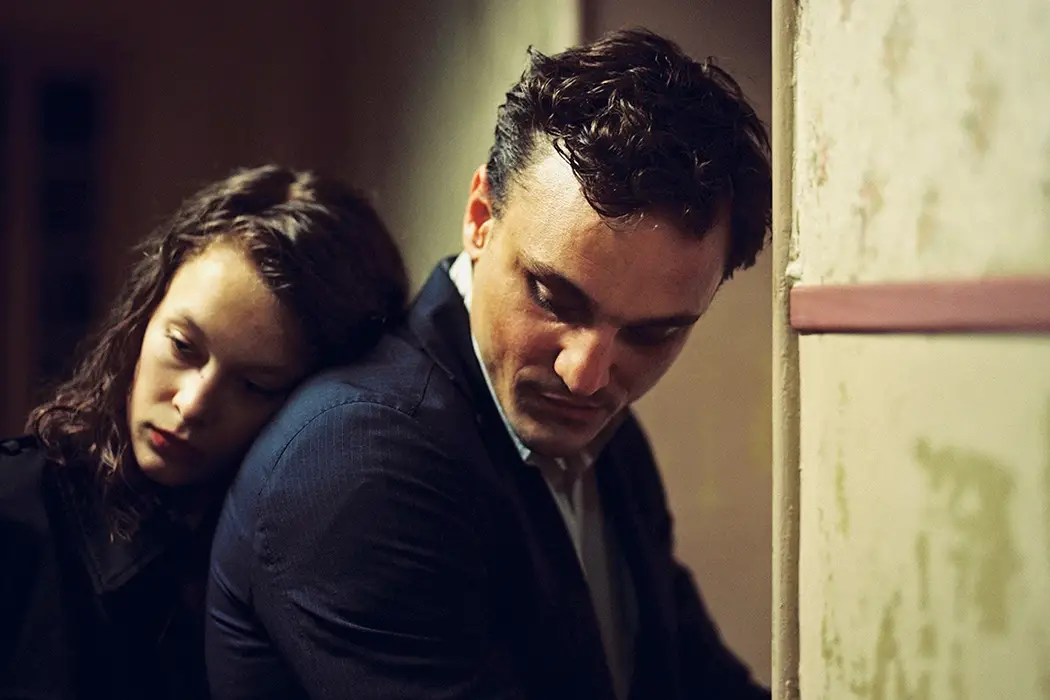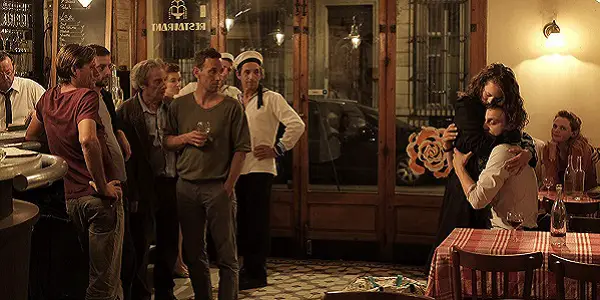TRANSIT: A Masterful Meditation On Life, Death & Limbo

Lee Jutton has directed short films starring a killer toaster,…
Contemporary German filmmaker Christian Petzold’s oeuvre is heavy on intense, atmospheric dramas – many centered around the magnetic presence of actress Nina Hoss – that focus on the almost mystical nature of one’s mortality and the inherent need in every human being to figure out where one truly belongs.
In Yella (a loose remake of Carnival of Souls), the protagonist nearly dies in an accident and finds her life afterward taking on increasingly strange twists and turns. In Barbara, the titular character is forced to make a new life for herself in rural East Germany after attempting to escape to the west and soon finds herself torn between two countries. And in Phoenix, a young woman survives Auschwitz and secretly inserts herself back into the life of the husband who may have betrayed her to the Nazis and believes her to be dead.

These three films all serve as prime examples of Petzold’s uncanny ability to probe his audience’s minds for answers to the questions that occupy the deepest recesses of our minds and souls. His films deftly mine the darkest periods of German history without coming off as emotionally manipulative – a true sign of his mastery as a storyteller.
Petzold’s latest film, Transit, fits neatly in amongst the rest in his oeuvre; it might also be his most haunting yet. An adaptation of Anna Seghers’ 1942 novel of the same name, it follows a young man on his journey to escape Nazi-occupied France. By avoiding getting hung up on historical details – despite technically taking place during World War II, the film is not shot as a period piece – Transit explores the timeless horror inherent in being a stateless, placeless person, trapped in an eternal limbo that feels like a space between life and death.
The In-Between
Georg (Franz Rogowski, whose brooding charisma and unusual, almost haggard handsomeness make him a dead ringer for Joaquin Phoenix) flees Paris for Marseille by hiding aboard a train bound for the port city with a grievously injured friend. His friend dies before reaching their final destination, leaving Georg with the unpleasant task of informing the man’s wife, an immigrant from North Africa who is both deaf and unable to speak, and his young son, who takes an instant liking to Georg and tries to adopt him as a substitute father figure. Yet this isn’t even the most complicated thing about Georg’s time in Marseilles.

Before fleeing Paris, Georg had been tasked with delivering an important letter to a famous writer named Weidel. Upon arriving at the man’s hotel, Georg discovers that Weidel has committed suicide, leaving behind a briefcase full of papers and an unfinished manuscript. Georg takes Weidel’s things with him, and upon arriving in Marseilles ends up somewhat accidentally assuming the man’s identity. Lucky for Georg, it turns out Weidel has been offered safe passage to Mexico for himself and his estranged wife, Marie – a happy accident, indeed.
Pretending to be Weidel, Georg moves in and out of endless lines at various embassies, encountering the same figures over and over again who are also seeking a way out of Marseilles before the enemy closes in on them. Among them, there is a beautiful woman (Paula Beers, playing the enigmatic female role one assumes Petzold would normally have bookmarked for Nina Hoss) who appears to be searching for someone; time and time again she grabs Georg’s shoulder and turns him around with a gloriously expecting smile, as though she expects him to be someone she knows. This is Weidel’s wife, Marie, and little does she know, she is chasing a ghost. Georg falls in love with Marie and vows to help her safely escape to Mexico – but how can he do so without revealing that he has stolen her dead husband’s identity?
The Sweet Escape
As previously noted, Transit is adapted from Seghers’ novel, which is based on her own experiences as a refugee during World War II. The characters in the film are fleeing fascist invaders, there are no cell phones, and the main form of transit is via transatlantic ocean liners, but this is where Transit’s similarity to your average period piece ends. The cars visible on the streets are modern, and the clothing worn by characters is neutral enough to belong to almost any era. The police are an ominous, omnipresent presence throughout Transit, constantly checking IDs and rounding up refugees who have entered the country illegally; yet as we all know, this is not something unique to the past, but a major factor in our present as well.
Petzold does not go out of his way to make Transit either obviously historical or obviously contemporary; like its characters, the film seems to exist in a separate space, removed from the historical record. Yet this unusual choice only serves to make Transit’s story of stateless humans seeking homes feel even more timely. It drives home the point that the refugee crisis is not something unique to then or now, but one that has plagued humanity as long as we have existed on this earth.
As Georg, Rogowski – whose breakout role was in the rollicking action-thriller Victoria, notorious for being shot all in one take – is absolutely enthralling. His restrained, subtle performance drives home the secretive nature of his character and his quest. In many scenes, Georg is not driving the action so much as observing it, much like the ghost whose identity he has assumed. He sits in cafés and lingers in lines, waiting with anticipation like so many others for the final word that will enable him to escape before it’s too late.

The idyllic beauty of the blue skies and clear waters of Marseilles as captured by Petzold’s usual cinematographer Hans Fromm sharply contrasts with the growing danger of Georg’s situation – the quiet before the storm, as it were – and yet somehow also adds to the quiet menace of it all. It’s as though the beauty surrounding the film’s characters is also taunting them, a mocking reminder that as much as they might want to do so, they cannot stay there.
Georg’s whirlwind romance with Marie feels both sudden and utterly inevitable, the heady, anxious atmosphere of the city driving these two lost souls together in a sea of so many others. Georg’s attempts to secure Marie passage without revealing to her how he is able to do so ratchets the tension of the story much higher than your average romance. This is only accentuated by the presence of Richard (Godehard Giese), a kindly doctor who has also fallen in love with Marie and wants to bring her to Mexico with him. Yet Marie believes that Weidel is still alive; she refuses to believe otherwise or to leave France without him.
From the point of Georg and Marie’s meeting, the story takes increasingly surreal twists and turns. Like so many Petzold films, the viewer is left unsure of whether the ending exists in reality or on another plane of existence. The answer, as always, is likely somewhere in-between.
Transit: Conclusion
Transit cements Christian Petzold’s status as a modern storytelling master. A film of surreal, sad beauty, it should not be missed.
What do you think? Does Transit sound like another quality film from Christian Petzold? Share your thoughts in the comments below.
Transit was released in the U.S. on March 1, 2019. You can find more international release dates here.
Does content like this matter to you?
Become a Member and support film journalism. Unlock access to all of Film Inquiry`s great articles. Join a community of like-minded readers who are passionate about cinema - get access to our private members Network, give back to independent filmmakers, and more.
Lee Jutton has directed short films starring a killer toaster, a killer Christmas tree, and a not-killer leopard. Her writing has appeared in publications such as Film School Rejects, Bitch: A Feminist Response to Pop Culture, Bitch Flicks, TV Fanatic, and Just Press Play. When not watching, making, or writing about films, she can usually be found on Twitter obsessing over soccer, BTS, and her cat.













